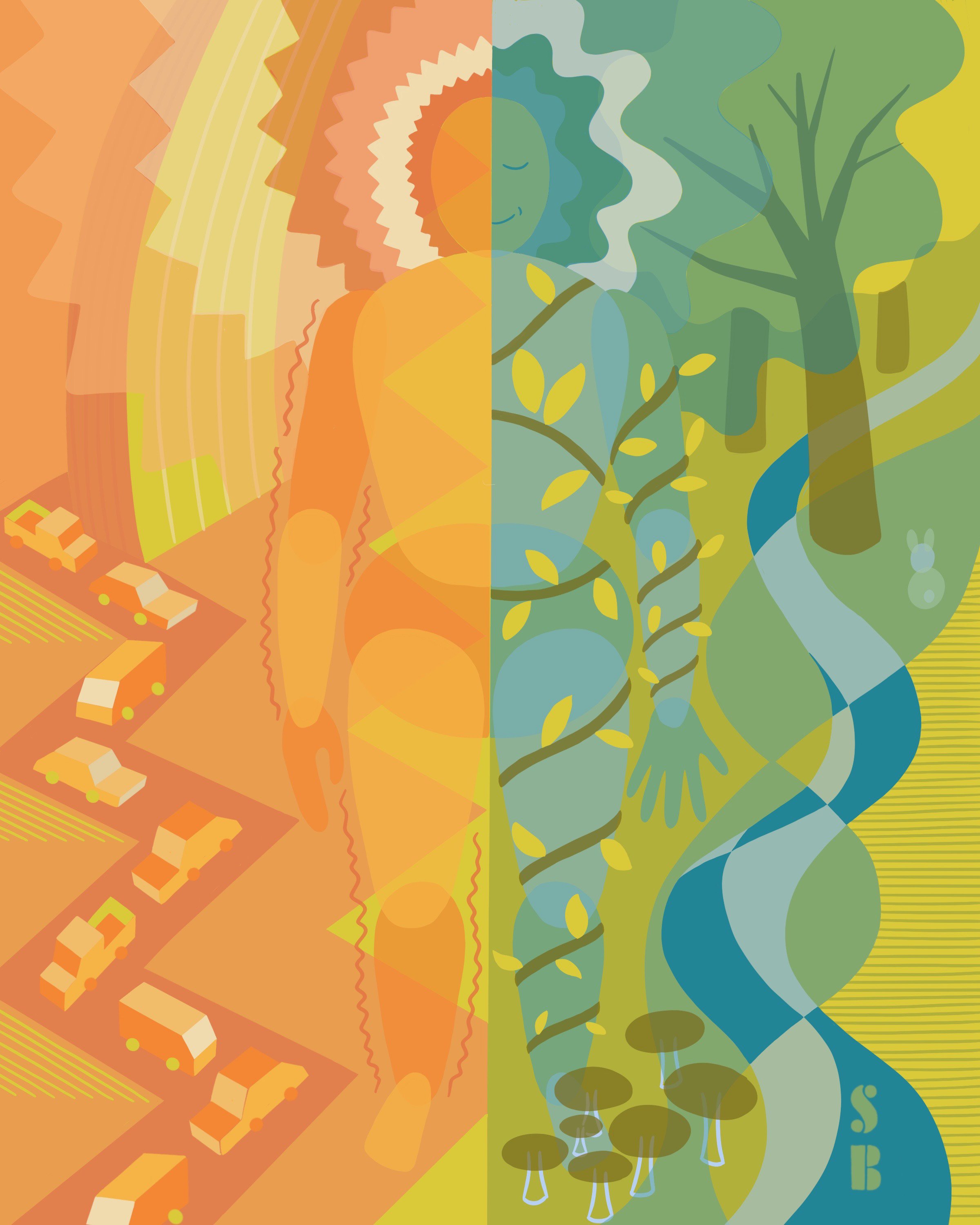Digital Detox: Prioritize Rest and Reap Unexpected Rewards
This is a set of guidelines I compiled for a group of people doing a 10-day detox. It’s not an original concept and the length of time is totally flexible. I’ve outlined why I personally recommend each step. The core concept is detoxing from unessential screen time/digital content/anything that impedes our ability to let our mind wander. Screen time is still allowed when it is intentional (in other words, not a mindless reflex).
Something needs to change
I think it’s safe to say that we are all addicted to our digital devices. They were in fact designed to monopolize our attention. Each ping or buzz is so tantalizing that it demands we pick up our phone. But did you know every time you are interrupted it takes you at least 8 minutes to get back to where you were in your train of thought? When you are deep in thought it’s closer to 20+ minutes. This is partially due to how much brainpower it takes to constantly jump between tasks.
Multi-tasking is a myth
The truth is we are built to single task even though that seems like a wasted opportunity. If I’m commuting to work, I need to maximize my time by absorbing knowledge in an audiobook or a litany of podcast episodes. While washing the dishes, I will catch up on the tv show I have been meaning to watch.
We are taught if we are not maximizing every moment of the day, we are squandering our precious time.
That is simply not true.
Step aside, hustle culture
The Goal of a Digital Detox
To reclaim squandered time, rest, and heal our relationship with our subconscious mind, which is where any original thought originates. Subconscious thoughts bubble up in dream-like language that most of us are too distracted to register.
Why do I suggest you do this?
Well, boredom is the key to creative breakthroughs and most of us never feel bored anymore. The second we do, we reach for our phones. This challenge is like an elimination diet, but instead of food, we are restricting digital content. In the end, we are going to reset our systems and then carefully add “food” back in. Hopefully, noticing the numbing impact of our habitual phone use will encourage us to rethink our relationship with digital content.
“Being bored is a precious thing, a state of mind we should pursue. Once boredom sets in, our minds begin to wander, looking for something exciting, something interesting to land on. And that’s where creativity arises.” —Peter Bregman
The Plan
Audit screen time (see below) in preparation for your detox.
Answer pre-detox questions as you prepare to embark on the journey. This is not a screen detox (most of us use screens for work). I like to think of it as a content detox.
Cut out non-essential screen time. Fight the urge to distract yourself and instead embrace silence. Allow yourself to truly rest (no, Netflix and chill doesn’t count). Befriend the feeling of boredom. Feel free to create a hybrid plan that works best for you.
After your detox, reflect on how it went by answering the post-detox questions.
The Payoff
It’s very hard to change our baseline understanding of something. My hope is that by resetting your system, you’ll have a breakthrough that would not have been possible (or as obvious) with your current digital habits. I can’t guarantee that you’ll cure cancer, but every time I’ve detoxed, I discover a couple of really exciting ideas.
Digital Detox Guidelines
In a nutshell: Cut out non-essential screen time. 7 days is a good length of time in my experience.
No-go zone:
Social media - people won’t notice that you are gone so no need to make an obnoxious announcement :P
Podcasts - yes they are interesting, but it is crucial to eliminate verbal chatter in order to let our minds rest.
TV - the average American watches 3 hours of tv per day, which translates into 9.3 years over their lifetime. Is there anything else you’d rather accumulate hours toward?
Audiobooks - similar to podcasts, it’s actually taking a lot more brainpower than you realize.
Articles/News
Scrolling the internet
Texting - a text is ok when it’s necessary for making plans, but in general, just call the person! I promise it’s not as scary as we think it will be. Most people are thrilled to get a surprise call in my experience.
Any phone use in the bathroom or in bed
As much as you want:
Music - some people swear by classical music, I personally love soft electronica focus music. See what works for you! Music helps me forget the passing of time and get deeper into my project.
Zoom/Phone calls/Facetime - connecting with humans is great! Prioritize actual connection instead of pseudo-connection (like texting or social media)
Yoga/workout videos - any online content that helps you feel your best is ok. If you’re not sure, check in with yourself afterward and be honest about how you feel. Energized? Depleted? Numb?
In Moderation:
Checking emails (as little as possible) - possibly remove desktop notifications
Some fiction reading with the device of your choosing
Consider
Turning off notifications - airplane mode is a simple way to do this
Keeping phone apps off your home screen - which apps make you the most trigger happy? Consider removing those to see how your behavior changes.
Temporarily deleting apps - you can always get them back lol. It’s not permanent.
Turning off your devices altogether outside work hours - at a minimum, unplug 1 hour before your bedtime.
iPhones have really great Focus settings you can fine-tune to suit your needs. (Settings —> Focus) My go-to focus setting mutes all notifications, but still allows calls from my contacts to come through. I know a lot of people worry about being reachable all the time in case of an emergency.
“Caring for myself is not self-indulgence, it is self-preservation, and that is an act of political warfare.”—Audre Lorde
Do your best and you will reap unexpected benefits
No one will be policing your behavior. This detox is not about perfection. We are not cloistered in a monastery up in the mountains. It does need to be pragmatic, which is why you are able to create whatever hybrid approach will serve you best.
I would warn you that the thing you fear giving up the most might be the thing you should definitely try giving up, at least for one day. Investigate why that one thing feels necessary. For some people it’s podcasts, for others it’s dating apps. Why is it so important to you/your identity? Try to sit with the question and see what comes up.
I believe in you. Go forth! I’m happy to talk through hybrid approaches if anyone isn’t sure what the best prescription will be. Also, there are several days to play around. Maybe start at level one and then add on more restrictions as you go to see the difference. Embrace the discomfort, my lovelies.
Audit Screen Time
Take note of your daily average for the last seven days and which app(s) take the most of your time. Click around and explore.
iPhone: Settings > Screen Time > See All Activity
Android: Settings > Digital Wellbeing > click the Graph.
Questions for Reflection
These are starter questions. Feel free to elaborate in whatever way feels good to you. Expect to spend 30-60 minutes on each reflection.
BEFORE
How do you feel about your current relationship with your phone and digital content such as tv, podcasts, social media, texting, and surfing the internet?
Would you say you spend a reasonable amount of time on your screen or is there room for improvement? Would your friends or family agree with this?
Did your screen time audit have any surprises? Which app do you use the most?
Can you remember the last time you ate a meal without simultaneously consuming digital content of some kind?
What is your intention for this detox?
How are you feeling about the impending detox? What are you the most resistant to?
Is there anything in particular you want to focus attention on during the detox? A passion project? Meditation? Learning a new skill?
AFTER
How did the detox go for you?
Which parts were particularly hard?
What are your takeaways from this experience?
What, if anything, do you want to change about your daily phone/digital content habit moving forward?
How can the group support your new goals for maintaining a healthier relationship with digital content?
The More the Merrier
Feel free to personally reach out to friends and family to share what you’re doing so they know you won’t be as available. They might even want to join you in the detox! Even just telling them about the screen time/digital wellbeing feature of their phones might blow their minds.
Text Less. Call More.
Some people feel nervous about seeming pretentious, but I have used the line, “hey, I’m not going to be accessible via text for the next week so if you need me call me.” If someone texts me, I simply call them back. It starts to feel natural and leads to much more interesting and meaningful conversations than would have occurred via text. The small risk reaps big rewards!

